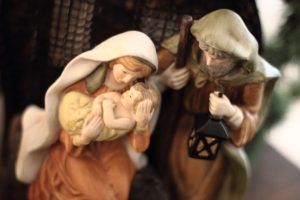
A four-year-old came to his mom, tears coursing down his face. “I have too many sads in my eyes!” he cried. (What description could be more perfect?) In reply, his mom hugged him tight and loved on him, making the sads all better.
But who comforts God when He cries?
God cries over us, for us
God made us in His image and likeness. He weeps when His people go astray. He’s near to the brokenhearted. We can deeply pain the Holy Spirit. Jesus wept over Jerusalem, cried during prayer, and shed tears at Lazarus’s tomb. Every entity of the Trinity cries.
So who comforts God?
Here’s why that’s been on my mind.
Judges 17 is about a man named Micah (NOT the prophet—that guy lived 500+ years later). The Micah in Judges has no compunction about stealing a huge amount of silver from his mother, who practices sorcery and places a curse on the thief before she learns it’s her son. On top of that, the whole family practices idol worship. Talk about onion layers of trust issues under one roof.
This Micah has two grown sons still living at home. Great environment, right? It’s one thing to mess up your life; it’s quite another to mess up your kids’ lives. Micah amps up his bad example when he melts down some of the silver he returns to his mother and makes an idol from it. Then, with no authority to do so, he “ordains” one of his sons as a priest.
A man of God who wasn’t
Along comes a wandering Levite. A triple threat, but not in the way you might think.
When each tribe of Israel was assigned their inherited land, God also designated forty-eight cities in which Levites would live so no Israelite would be more than a day’s walk from a place of worship. This young Levite hadn’t lived in one of those cities, and Micah’s town wasn’t a Levite city, either. Even a Levite apprentice should know better than to settle in either place.
First big red flag: the Levite doesn’t know where he belongs or why he should care. Second red flag: the rogue accepts a wage from Micah (forbidden by Mosaic law). Third red flag: Micah demotes his son, elevates the Levite to “house priest” (sacrilege and blasphemy), and the Levite is cool with that.
What the Levite lacks in wages, Micah makes up for with counterfeit priestly garments and reverent titles.
God must have cried
Now Micah has his own Levite to go with his home-grown cult theology. He’s set. Surely he can co-opt God into giving him all he wants. Micah utters the original health-and-wealth gospel when he says, “Now I know that the Lord will prosper me, because the Levite has become my priest” (Judges 17:13 NASB).
Religious activity minus a genuine relationship with God never ends well.
The freelancing Levite does all sorts of things he never should do. The story goes from grim to gruesome in the next chapter.
I wept when I read Judges 17–18.
I believe God weeps over our fallen state every day. Over modern-day idolatry and the colossal time we waste on things that aren’t of Him. How quickly could we end world hunger if we didn’t need to spend money on fighting wars, rescuing people from sex traffickers, pay for litigation to defend our religious freedoms, and more?
What comforts God
If all that makes God cry, then what comforts God?
What my friend did with her four-year-old son who had too many sads in his eyes.
Crawl into God’s lap and love Him without restraint.
What does that look like?
Live like you are made in His image—because you are. Live so you reflect all His attributes.
Praise Him for who He is. Thank Him for caring for you and bearing your burdens. Intercede for the world’s shortcomings. Trust Him that no circumstance or person is beyond the hope of redemption. Honor Him by spending time with him—without tying any expectations to it. God will have joy in His eyes when you do that.
God, You love me with a boundless, everlasting love, yet I return so little of that to You. Forgive me. Take a spiritual inventory of me and grant me Your discernment so I will always lean away from the things of this world and instead lean into You. Amen.
Never miss a post!
**************************************
Many thanks to author friend Arden Conroy for sharing that precious moment with her four-year-old.
BONUS:
As always, the Bible contains more layers to unpack.
Context:
When we meet Micah, he’s likely in his mid-forties or older. His sons and the Levite are roughly the same age: mid-twenties to early thirties.
Food for thought:
1) The name “Micah” means “Who is like Jehovah.“ What might that say about his early childhood? Did pious parents raise Micah? In Judges 17, his father is absent from the story; his mother is deep into the occult. What does that say about nature vs nurture? The ongoing need for a strong father figure?
2) Micah was part of the tribe of Dan. That tribe had done an abysmal job of eliminating pagan cultures from the area. What does that say about following one’s own ways? Tolerating versus embracing things not of God?
3) In different ways, both Micah and the Levite were content to settle for far less than God had called them to be. How did that continue to affect them? Micah’s family?





Leave a Comment